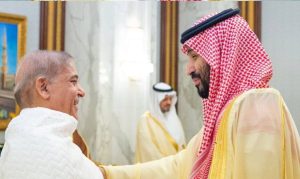Pakistan’s Prime Minister Shehbaz Sharif visited Saudi Arabia earlier this week on his first foreign visit since being elected in February.
In Mecca, the premier and his delegation met with Saudi Crown Prince Mohammed bin Salman. In addition, Sharif held a private meeting with the Crown Prince. What was discussed at the one-on-one meeting has not been disclosed, but Pakistan said the two leaders agreed to strengthen ties.
It is customary for Pakistani premiers to visit Saudi Arabia after being sworn into office, underlying the close ties between the two countries. However, Sharif’s recent visit is important for many reasons that go beyond just following a tradition.
To begin with, Pakistan’s current civil-military leadership is keen to persuade its partners and allies that after a turbulent period of political unrest, stability has returned to Pakistan. Pakistan’s close allies, especially those in the Gulf, have been asking Islamabad for some time to restore a semblance of stability so that they can respond positively to Pakistan’s requests for financial concessions and investments. Sharif’s trip to the Saudi kingdom signals that stability.
It is important to recognize that Pakistan is facing serious economic challenges. Last year, Pakistan’s economy worsened to such an extent that talks about its defaulting on loans dominated headlines for several months. The situation deteriorated further when Pakistan’s allies refused to give the country substantial financial assistance to bail it out of the crisis.
During the recent talks, Riyadh may have urged Pakistan to restore monetary stability through an agreement with the International Monetary Fund (IMF) to gauge its commitment to stabilization and reform.
There are signs that Pakistan has succeeded in both areas to initiate talks with Saudi Arabia about future investment. It has successfully concluded its current agreement with the IMF and plans to initiate talks with the organization for a longer program. Similarly, there has been a noticeable decline in political turmoil in Pakistan following the elections and installation of a new government.
These developments are backed by the economic reforms that the country initiated over the last year. During his previous tenure as prime minister (April 2022-August 2023), Sharif took steps to privatize huge loss-making state-owned enterprises like Pakistan International Airlines.
Under the outgoing interim government, the reform process took modest strides and is currently gaining momentum under the current administration. This continuity of policy over the last couple of years has perhaps convinced the Saudi leadership that Pakistan will not only protect its investments, but also become a stable partner.
Pakistan’s policy approach may have begun to pay dividends. After Sharif met Salman, Riyadh committed to accelerating the initial round of a $5 billion investment package that had been previously discussed but was not materialized, in part because of the political unrest in Pakistan.
In addition, the Crown Prince has agreed to travel to Pakistan. Several significant initiatives will probably be launched during that visit. This may include the long-discussed Saudi involvement in the Reko Diq mining project and the commencement of construction on a $10-billion oil refinery at Gwadar Port.
Sharif may have requested the Saudis for a new oil subsidy during his recent visit. A fresh subsidy would serve as a hedge against any future increases in the international oil market price that would jeopardize Pakistan’s economic goals. This is especially concerning in Islamabad because of the current conflict between Israel and Hamas, which could spread across the Middle East. High-priced oil imports have the potential to increase Pakistan’s current account deficit and strain its declining foreign exchange reserves.
Sharif’s visit to the Kingdom is expected to restore confidence in Pakistan-Saudi Arabia relations. The country must avoid another round of political turmoil in the upcoming months to preserve its ally’s trust.

































